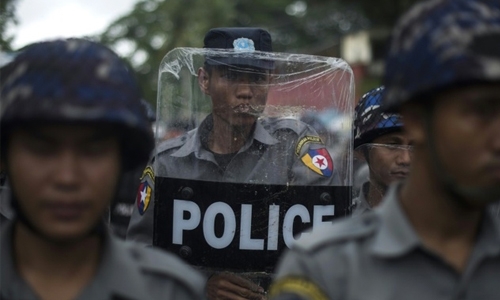The western state is bisected by religious hatred focused on the stateless Rohingya Muslim minority, who are reviled by many Buddhists and perceived as illegal immigrants.
Friday's fighting exploded around Rathedaung township, where there has been a heavy build up of Myanmar troops in recent weeks, with reports filtering out of killings by shadowy groups, army-blockaded villages and a renewed exodus of refugees heading towards neighbouring Bangladesh.
Some 20 police posts came under attack in the early hours of Friday by an estimated 150 insurgents, some carrying guns and using homemade explosives, Myanmar's military said.
"The military and police members are fighting back together against extremist Bengali terrorists," Commander-in-Chief Min Aung Hlaing said in a statement on Facebook, using the state's description for Rohingya militants.
The office of de-facto leader Aung San Suu Kyi said 12 security officials had been killed alongside 59 militants.
One resident in Maungdaw, the main town in northern Rakhine, said gunfire could be heard throughout the night.
"We are still hearing gunshots now, we dare not to go out from our house," the resident said by phone, asking not to be named.
Despite years of persecution, the Rohingya largely eschewed violence.
But a previously unknown militant group emerged as a force last October under the banner of the Arakan Rohingya Salvation Army (ARSA), which claims to be leading an insurgency based in the remote May Yu mountain range bordering Bangladesh.
A Twitter account (@ARSA_Official) which frequently posts purportedly from the group confirmed its fighters were engaging Myanmar's military in the area and accused the soldiers of carrying out atrocities in recent weeks.
Myanmar says the group is headed by Rohingya jihadists who were trained abroad but it is unclear how large the network is.
Suu Kyi's office posted pictures of weapons that had been taken from militants, mainly home-made bombs and rudimentary knives and clubs.
Friday's violence pushed more Rohingya to leave, with two boats containing around 150 women, children and elderly people attempting to cross the Naf river into Bangladesh.
But they were pushed back.
"They were scared. We felt pain to send them back," a Border Guard Bangladesh (BGB) officer told AFP.

